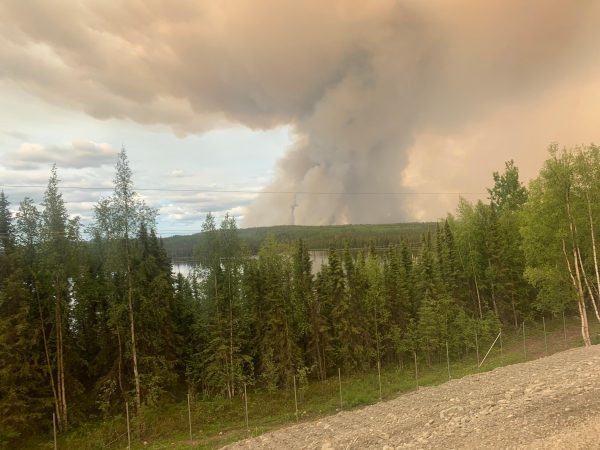
More Alaskans than not Thursday experienced poor air quality from wildfire smoke across much of Interior and Southcentral Alaska.
That includes smoke in Anchorage from the Swan Lake Fire on the Kenai Peninsula, which has grown to nearly 50,000 acres. Multiple Interior fires are burning too, like the Shovel Creek Fire near Fairbanks, where fire suppression efforts are focused on stopping the fire from spreading to residential subdivisions.
Air Quality advisories are in effect for residents of the Kenai Peninsula, Anchorage, the Matanuska-Susitna Borough and much of the Interior, including the greater Fairbanks area. And the state Division of Air Quality is warning the widespread wildfire smoke and its potential health impacts could continue until at least next week.
“Now, region-wise, we have at least half the state with air quality advisories,” said state Air Quality program specialist Mark Smith.
Smith said the elderly, children and others should avoid exertion when air quality is deemed officially “unhealthy,” and everyone else should limit prolonged exertion.
“You know you have the PM2.5 particles in your lungs, and if you already have some type of lung disease, heart disease, COPD, young children, anyone with asthma, any type of particulate is going to take the place of oxygen in your lungs and will definitely affect ’em.”
National Weather Service Meteorologist Michael Lawson said an inversion layer in the atmosphere, along with a high-pressure ridge “quieting” the weather and a gentle wind pushing the smoke combined to create smoky conditions for a huge swath of the state’s population Thursday.
“The same inversion conditions are going to set up again tonight, so we would expect much of the same,” Lawson said
Both Lawson and Smith, the air quality specialist, say the smoky conditions are expected to last at least into the weekend.
“Well, pretty high confidence that this ridge is going to stick around through at least Saturday at this point,” Lawson said. “So we’re not expecting too much change. It’s kinda hard to predict exactly where the smoke is going to go, but conditions shouldn’t be changing too much.”
Smith says the air quality advisories will likely be extended to Monday or beyond. Up-to-date information about regional air quality is available at dec.alaska.govTwitter feed.
Along with the smoke, the National Weather Service says hot, dry conditions – dangerous for additional fire growth – are expected to continue across much of Alaska.
Casey Grove is host of Alaska News Nightly, a general assignment reporter and an editor at Alaska Public Media. Reach him at cgrove@alaskapublic.org. Read more about Casey here.





